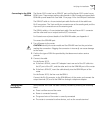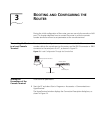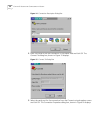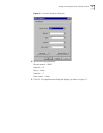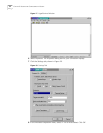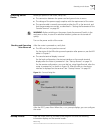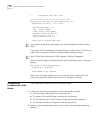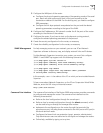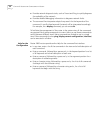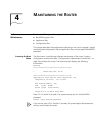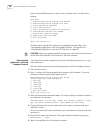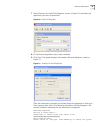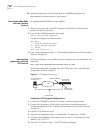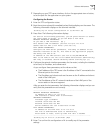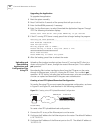
Configuration Fundamentals of the Router 35
3 Configure the WAN port of the router:
■ Configure the physical operating parameters (the operating mode of the serial
port, baud rate, and synchronous clock) of the port according to the
transmission medium of the WAN. For the dial-up port, you need to configure
DDR parameters.
■ Configure the link layer protocol encapsulated on the port and the related
operating parameters according to the type of the WAN.
4 Configure the IP addresses or IPX network number for all the ports of the router
according to the division of the subnets.
5 Configure the routes. If you have to start up the dynamic routing protocol,
configure the related operating parameters of the protocol.
6 Create the security configuration for the router, as necessary.
7 Create the reliability configuration for the router, as necessary.
SNMP Management For help managing routers on your network, you can use 3Com Network
Supervisor software to discover, map, and display network links and IP devices.
To allow Network Supervisor to monitor your routers, you must first configure
SNMP V1 and SNMP Trap support with the following commands:
[3Com]snmp-agent sys-info version v1
[3Com]snmp-agent community read <read-community-string>
[3Com]snmp-agent community write <write-community-string>
[3Com]snmp-agent trap enable
[3Com]snmp-agent target-host trap address <addr> parameter
v1 securityname <security-name-string>
In this example, <addr> is the address of the PC on which you have installed Network
Supervisor.
To learn more about Network Supervisor, on the 3Com Corporation World Wide
Web site, enter this URL into your Internet browser:
http://www.3com.com/3ns
Command Line Interface The command line interface of the Router 3000 series routers provides commands
to configure and manage the router. The command line interface has the
following characteristics:
■ Performs the local configuration through the console port.
■ Performs local or remote configuration through the telnet command, which
can be used to log on directly and manage other routers.
■ Implements the configuration on the router through the terminals (the
asynchronous port, including those connected to the AUX port and AS port) in
the dumb terminal mode.
■ Configures the hierarchical user protection (guest, operator, administrator).
Only administrator users are authorized to configure and manage the routers.
■ Online help, available by typing ? at any time.



